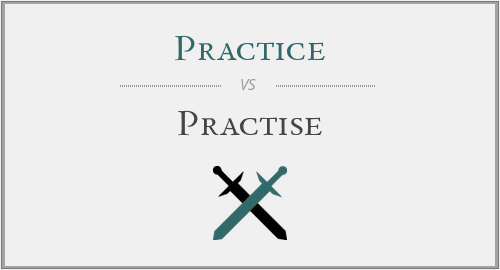With "practice" and "practise" being distinct due to only one letter, you might be tempted to think it's the same situation as in the case of "device" and "devise". More exactly, that this different spelling shows that one is the noun and the other is the verb. Or, you might believe that the source of this difference is the distinct pronunciations and spellings preferred in UK and US.
The truth is somewhere at the middle, a combination of these two. The different spellings are illustrating both British/American English variations and verb/noun differences. So let's sort these out and make sure you can clearly identify in which context and how you should use "practice" and "practise" so you never misspell them.
Practice vs. Practise
Looking to their meanings and definitions, regardless of the vocabulary where they are used or of the parts of speech they represent, both "practice" and "practise" refer to the same concept. Basically, they define the action that is repeated several times in order to learn or improve an ability, a skill, knowledge etc.
So from the perspective of your message, there will be no error if you replace them. They will be, anyway, considered a misspelling, if you confuse the part of speech they represent or if you use them wrongly in US/UK English, so let's establish these too, in the paragraphs below.
When do we use "practice"?
Let's start with using "practice" correctly. In US English, this is the only spelling accepted. American English users spell the word "practice" both as a noun and as a verb. In addition to this, in UK English, "practice" is only referred to as a noun.
Example 1: I need more time to practice this exercise before getting tested for it because I'm not very familiar with the method of solving it yet. - "practice" is used as a verb only in US English, defining the action of repeating something in order to learn it.
Example 2: Your yoga practice is so relaxing. - "practice" is used as a noun both in UK and US English, referring to the repetition of the same action several times in order to improve or gain a skill/ability.
When do we use "practise"?
With "practise", things are even simpler. "Practise" is only used in UK English and only as a verb. That is the only difference between it and "practice:.
Example: I want to practise the way I pronounce English words before I give my speech tomorrow in front of all those people. - "practise" is only used in British English, as a verb referring to the action of repeating the same action in order to learn or improve it.
Conclusion
Shortly, "practice" is always spelled like this as a noun, both in UK and US English, and only spelled like this as a verb in US English. As for "practise", this is only spelled with an "s" in UK English, when it's a verb. Nothing more and nothing less to remember.





Have a discussion about this article with the community:
Report Comment
We're doing our best to make sure our content is useful, accurate and safe.
If by any chance you spot an inappropriate comment while navigating through our website please use this form to let us know, and we'll take care of it shortly.
Attachment
You need to be logged in to favorite.
Log In